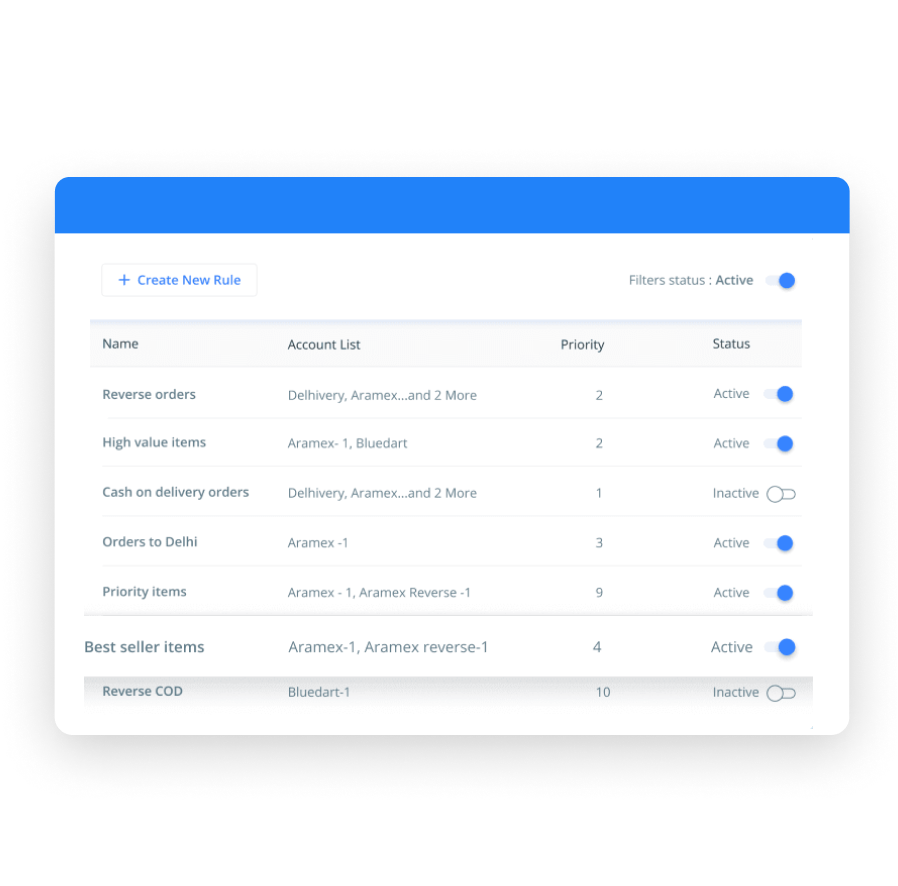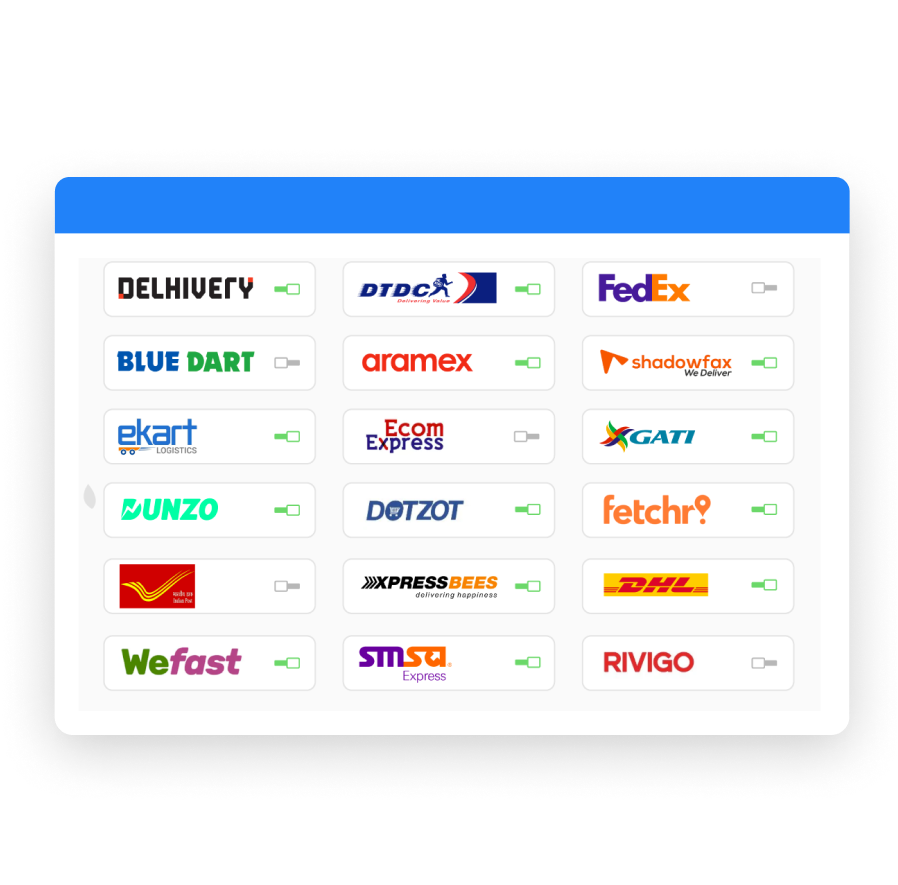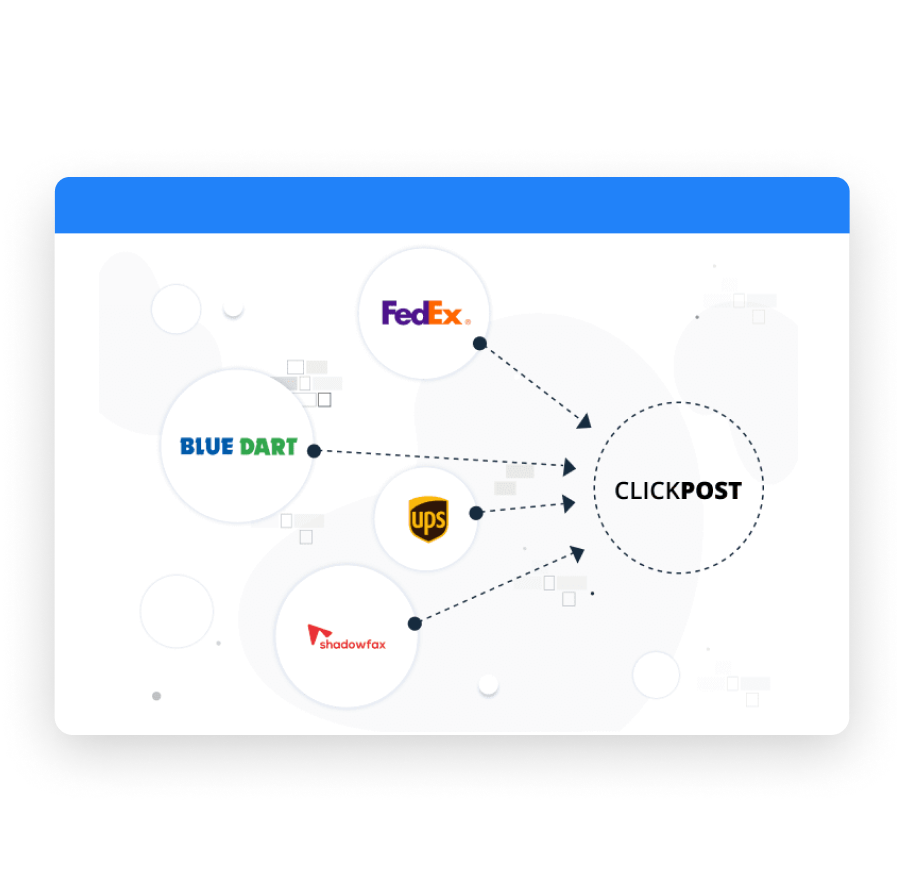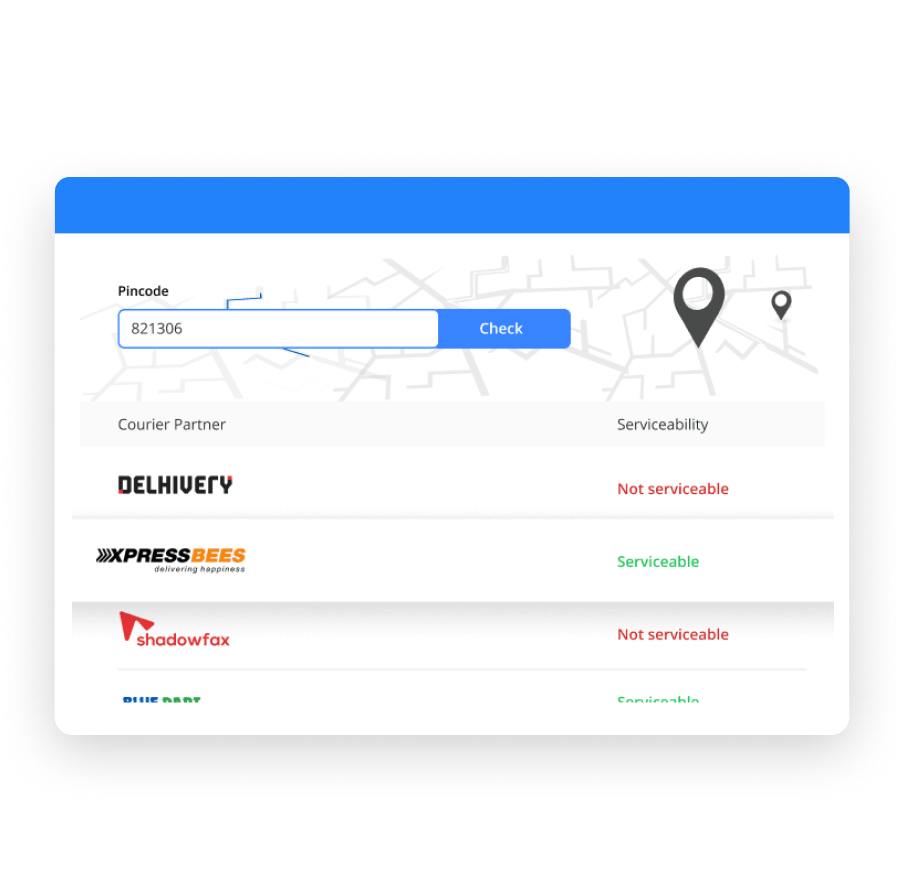Data driven carrier recommendation engine
Outcome: Lower shipping costs, better Logistics metrics


Go-live with a new carrier in just 1 day
______
Integrating with carrier APIs is a difficult and time-consuming process. ClickPost comes pre-integrated with 500+ carriers.
Outcome: Faster carrier onboarding and greater flexibility in carrier choice
Generate shipping labels across carriers from a single dashboard
Enable printing shipping labels across all carriers using ClickPost API or ClickPost dashboard. Carry out all related activities from a single location.
Outcome: Streamline warehouse operations and order pickup


Get real-time zipcode serviceability
Carriers keep on changing their serviceability. Get real time data on each carrier’s serviceability using ClickPost API. Avail this service at the time of customer checkout and at the time of carrier allocation
Outcome: No fulfillment exceptions as a result of outdated pin-code data
Why should you use multiple shipping carriers for your e-commerce business?

Greater reach
No single carrier can reach all pin codes and regions in the country. The more carriers you tie-up with, the more your pin code reach grows, enabling you to serve a wider range of customers. Even those in remote areas.

The better customer experience
When you tie up with multiple carriers, you can maintain different rules and terms with each of them. These can relate to different areas of customer service and allow you to offer more options to customers, thereby improving their experience.

Leverage strengths of all carriers
Each carrier offers its own advantages and disadvantages. By tying up with multiple carriers, you can get the best of all the worlds. One carrier may be adept at reaching remote areas while another may provide secured shipping. You can push them to utilise their own resources more effectively.

Lower shipping cost
Another place where leverage comes in handy with multiple carriers is in pricing. Each carrier has their own shipping rates. However, with a large volume of orders coming in, fortified by projections of further order volume increases, you can negotiate the best shipping rates with different carriers. This will keep your total cost low.

Lower shipping exceptions
Shipping exceptions are the ultimate bane of eCommerce companies and a huge roadblock to growth. When you have employed multiple carriers, you can use their past performance data to select the right one for each order. This will consequently help you reduce the number of shipments that end up with exceptions.

Lower business disruption risk
As an online store, you want to be open for business every day of the week and every week of the year. If you’re entirely reliant on 1 carrier, then anytime that carrier becomes unavailable (even for just a day) your business will take a big hit. Multiple carriers provide you with backup options, therefore ensuring the wheels of business keep turning.
FAQs on multi carrier integrations
Q1: What does Multi Carrier Shipping Mean?
A: Multi-carrier shipping is a term that indicates an ecommerce business has selected multiple carrier partners to handle its shipping operations. This typically happens when order volumes increase to an extent that a single carrier cannot handle them alone, or when an ecommerce business chooses to expand its services to more pin codes, therefore requiring the reach of multiple carriers.
Q2: What is a Multi-Carrier Shipping Software?
A multi-carrier shipping software is a software that can be utilised by ecommerce businesses to integrate with multiple shipping partners. Through these integrations, orders across all connected carriers can be tracked from a single location.
Q3: How does a multi-carrier shipping software work?
A multi-carrier shipping software enables an eCommerce business to integrate its system with multiple carrier API integrations. This means order tracking updates are all sent to a single location for viewing. Through these API integrations, other order information can also be viewed, stored and analyzed to improve shipping operations.
Q4: Where do multi-carrier shipping software operate?
Multi-carrier shipping software can usually operate over a very wide range, reaching eCommerce businesses in multiple countries. That being said, most multi-carrier shipping software has a designated area of operation, like the US, the Middle East, India, Australia, and Europe.
Q5: Why do I need multi-carrier shipping software for my eCommerce business?
If you are tied up with multiple shipping partners, you will definitely need multi-carrier shipping software. Without such software in place, you have to manage your orders individually from the respective shipping partners’ platforms. The main benefit of utilizing a multi-carrier shipping software is to enable effective and efficient order management, thereby promoting maximum fulfillment.
Q6: What can a Multi-Carrier shipping software do to help my eCommerce business?
First and foremost, multi-carrier shipping software helps you integrate with all your partnered carriers so you can view orders with them from 1 easy-view location. This system of order management is the base role played by any multi-carrier shipping software. However, a truly effective multi-carrier shipping software should also be able to assist you in other areas of your shipping operations. This can include providing solutions to unique problems using data analytics, creating workflows for Exceptions management with respect to both NDRs and Returns, and enabling better communication between you, your carriers and your customers. All in all, these solutions should aid you in improving the overall shipping experience & customer experience.




